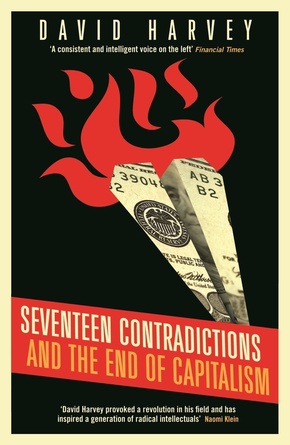
Seventeen Contradictions and the End of Capitalism - Siebzehn Widersprüche und das Ende des Kapitalismus, englische Ausgabe
| Verlag | Profile Books |
| Auflage | 2015 |
| Seiten | 352 |
| Format | 13 x 20 x 2,2 cm |
| Gewicht | 280 g |
| Artikeltyp | Englisches Buch |
| ISBN-10 | 1781251614 |
| EAN | 9781781251614 |
| Bestell-Nr | 78125161UA |
WORUM GEHT ES?
Gibt es seit dem Ende des Kommunismus wirklich keine echten Alternativen zum Kapitalismus? David Harvey meint: Doch! Man muss allerdings das Wesen des Kapitalismus genau verstehen, um ihn durch einen revolutionären Humanismus ersetzen zu können, in dessen Zentrum nicht das Kapital, sondern der Mensch steht. Konkret untersucht Harvey die Anhäufung von Kapital, das fatale Wachstumscredo, den spekulativen Immobilienmarkt und den Raubbau an der Natur. Er beschreibt jedoch nicht nur Krisen, sondern zeigt auch Chancen auf. Denn gerade die Widersprüche im Kapitalismus können Anfangspunkte für neue politische und kulturelle Bewegungen sein. Die utopische Kraft dafür kommt aus den Städten.
WAS IST BESONDERS?
Eine fundierte, realitätsnahe Kapitalismuskritik und zugleich ein Manifest des Wandels geschrieben von einem der führenden Sozialtheoretiker der heutigen Zeit.
WER LIEST? Jeder, der die globalen Machtverhältnisse kritisch sieht Leser von Stéphane Hess el, Michael J. Sandel, David Graeber und Thomas Piketty
Kurzbeschreibung:
Following on from The Enigma of Capital, the world's leading Marxist thinker explores the hidden workings of capital and reveals the forces that will lead inexorably to the demise of our system.
Klappentext:
You thought capitalism was permanent? Think again.
David Harvey unravels the contradictions at the heart of capitalism-its drive, for example, to accumulate capital beyond the means of investing it, it's imperative to use the cheapest methods of production that leads to consumers with no means of consumption, and its compulsion to exploit nature to the point of extinction. These are the tensions which underpin the persistence of mass unemployment, the downward spirals of Europe and Japan, and the unstable lurches forward of China and India.
Not that the contradictions of capital are all bad: they can lead to the innovations that make capitalism resilient and, it seems, permanent. Yet appearances can deceive: while many of capital's contradictions can be managed, others will be fatal to our society.
This new book is both an incisive guide to the world around us and a manifesto for change.
Rezension:
Praise for The Enigma of Capital:
'A lucid and penetrating account of how the power of capital shapes our world
Book of the Week Independent
